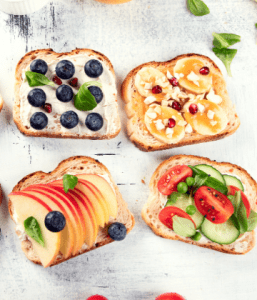You’re getting ready to go on your morning run and find yourself feeling a bit peckish but wait – what you could possibly eat before heading out that is going to tick all of the below boxes:
-
- • Give you energy but not side cramps
-
- • Fill you up enough – but not too full
-
- • Help your body by providing it nutritional value, not hurt it with unhealthy foods
- • Satisfy your desire for a snack, without affecting your performance
We get it – that’s why Coast Sport Accredited Practicing Dietitian Jo Allan is here to provide you some nutritional insight on what to eat before a run.
Things to Consider Before Your Run
• What is the expected length of my run?
• What is the expected duration of my run?
• What is the expected intensity of my run?
• Is it a training run or is it a race?
The main factors that cause fatigue during running are not enough fuel (carbohydrates) and not enough fluid (dehydration). So, the key is to optimise both fuel and fluid so that you can reach your running potential, whether it’s a 5k fun run or ultra-trail event.
Let’s look into how to optimise that fuel via healthy eating.
What to Eat Before a Run
For a long run or race, its best to eat a healthy meal, containing mostly carbohydrates + a little protein, 2 hours before the start. This way, you should not feel any discomfort during the run, and have fuel ready for your muscles to use. The meal should be something you feel comfortable with, and for many runners this will be their usual breakfast, as most runs start in the morning.
It’s important to trial a few different options in training before having it for the first time before a race, to figure out what feels best. You may find a healthy diet plan that suits you best by trial and error.
Some examples of what to eat before a run: 
• Muesli + yoghurt + fruit + milk
• Weet-bix + chia seeds + drizzle of honey + milk
• Porridge oats + 1 tbsp nuts + 1 tbsp dried fruit + milk
• 2 x multigrain toast + peanut butter
• 2 x gluten free toast + ¼ avocado + vegemite
• 2 x toast + scrambled tofu + 1 tbsp nutritional yeast
• 2 multigrain toast + 2 eggs; fruit smoothie with 2 tsp nut butter and milk
Click for more tips on How to Eat to Perform
Light Snacks Before a Run
For training that is estimated to run under an hour, a light snack should suffice within 15 minutes of starting.
Some examples of light snacks to eat before a run would be:
• Fruit (banana/apple/dried fruit)
• A coffee made on milk
• 1 slice toast + vegemite
• 3 tbsp yoghurt
• 1 x toast + nut butter

Hydrate Before a Run and Stay Hydrated
Fluid is beneficial and carrying a hydration pack of some sort and having a sip of water every 5 minutes or so, is a useful guide.
We recommend hydrating at least 30 minutes prior to running for shorter runs.
For marathon events we recommend doing the bulk of your hydration at least 48 hours prior to your, maintaining your hydration, and drinking two 8-ounce glasses of water or sports drink exactly two hours before the run starts.
During a run, it is helpful to consume fluid, and again depending on the length of the run, carbohydrates as well.
Carbs or No Carbs?
For training that is estimated to run under an hour, your body may not require carbs along the way, especially if you have had a meal 2 hours before and/or a light snack 15 minutes before setting out.
Running over an hour?
30-60g of carbohydrates per hour for runs over an hour (1/2 marathon to marathons) improves performance by reducing muscle fatigue and to help maintain pace and cognition.
Easy to digest carbohydrate-rich options such as sports drinks, gels and chews that are easy to carry, are good options.
Again, trialling these in training is vital, as some runners can experience the dreaded ‘gut bomb’ (urgent need to pass a bowel movement at an inconvenient time).
Several products may need to be trialled before finding the one that suits you the best.
Tailwind is the ‘go to’ product for many long distance runners, as it guarantees no gut bombs, can be adjusted to your individual needs/training/racing requirements, and comes in an unsweetened (so called ‘naked’) version, to avoid ‘flavour fatigue’, which is common in long events.
Ultra events (trail or marathon) require extensive nutritional support and planning, to avoid a DNF (Do not finish).
The Finish Line – Coast Sport

We are here to help you along the way whether it be a personalised nutritional plan for your leisurely running or a strict diet for marathon training or tips on eating for a relay.
Consulting with an Accredited Sports Dietitian is highly recommended for such training and events.
Are you a Central Coast local?
Contact us today to book in with Coast Sport Dietitian, Jo Allan for any of her Sports Nutrition Services.
Happy National Nutrition Week by Nutrition Australia and remember – Healthy Nutrition Means a Healthy Smile!




 Helping the Central Coast Feel Well, Move Well and Perform Well!
Helping the Central Coast Feel Well, Move Well and Perform Well!